Fair, Aware and Engaged
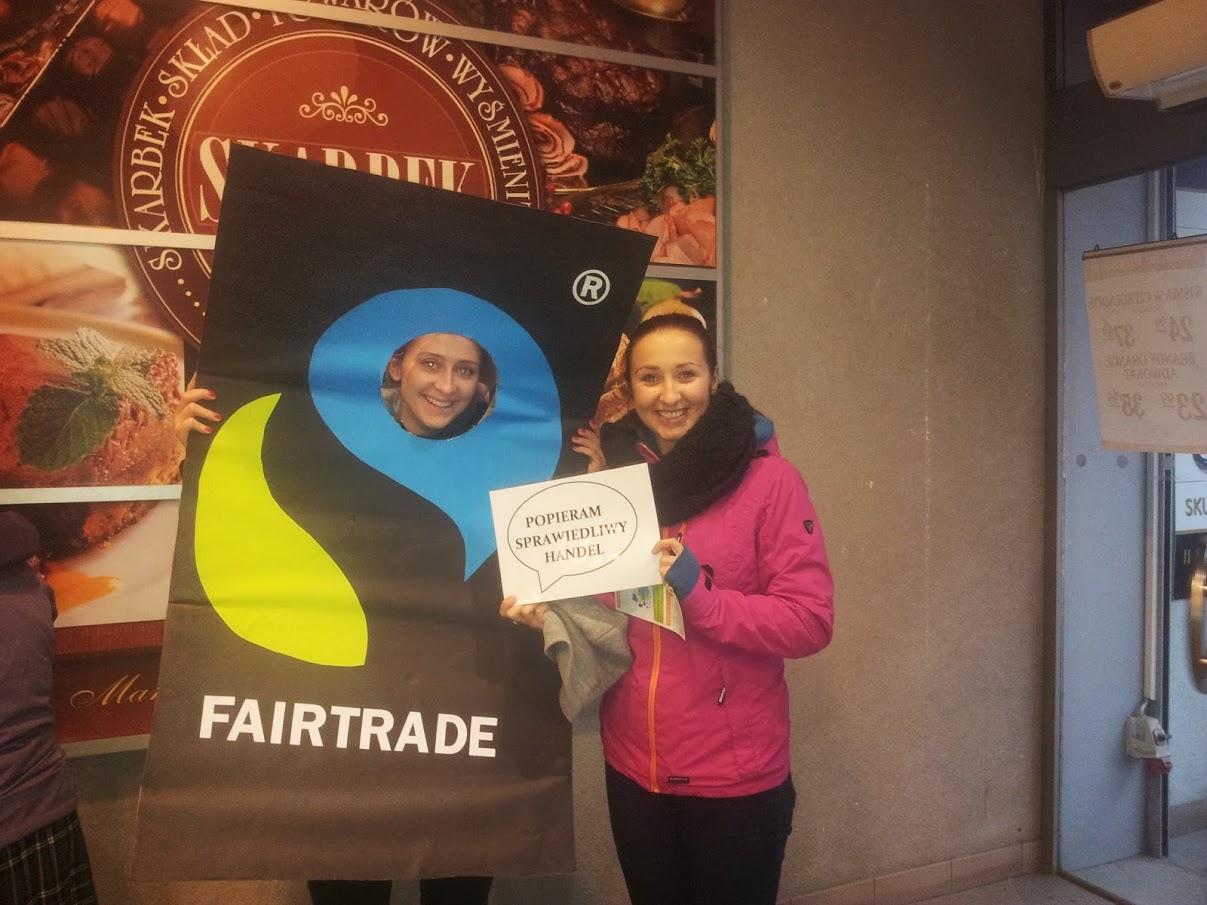 [Photo taken by students from Zespół Szkół Handlowych in Katowice during Fair Train 2014 event.]
[Photo taken by students from Zespół Szkół Handlowych in Katowice during Fair Train 2014 event.]
Project description
Fair, Aware and Engaged. Creating foundations for the Fair Trade Schools campaign is a nationwide educational and engaging pilot project related to social injustice and economic discrimination in the globalized supply chains.
Project partners
Fairtrade Česko a Slovensko (Czechy) |
Drustvo Humanitas
|
TVU Mondo
|
Fair Trade á Íslandi
|
Project objective
We want to raise students’ awareness about working conditions in the countries of the South; develop consumer awareness and citizen attitudes, engage children and young people to campaign for a fairer world; re-engage student bodies and students cooperatives to work towards responsible consumption.
Our hope is to build foundations for the regular Fair Trade Schools campaign which is needed to affect choices of future consumers. We assumed that within the project framework we will be able to co-ordinate educational activities in 40 Polish schools.
Project stages
The project implements the following elements:
Preparation
This project needs campaigners and educators since managing activities in 40 schools located all over Poland is impossible without a team. So our first activity was to get in touch with KSH founders to introduce them to the project and deepen our relationships with them.
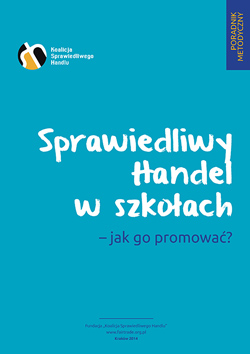 In order for to support teachers with practical tools we created two publications on Fair Trade for use in schools. The first one is a teachers’ guide. It has 90 A4 pages (initially we planned to provide 40) and contains a thorough description of Fair Trade as well as 4 very detailed lesson plans to engage students in the classroom.
In order for to support teachers with practical tools we created two publications on Fair Trade for use in schools. The first one is a teachers’ guide. It has 90 A4 pages (initially we planned to provide 40) and contains a thorough description of Fair Trade as well as 4 very detailed lesson plans to engage students in the classroom.
Here’s the publication’s TOC:
- Introduction
- Fair Trade: history, values, principles, organisations
- Fair Trade Towns/Schools campaigns and more
- Fair Trade and Polish Education System
- How to best present problems of the Global South
- Lessons conspectus
- How much is a cup of tea?
- Fair Trade – it pays to be fair!
- Be fair while sharing
- Who works to support us?
- Events suited for Fair Trade promotion
- Fair Trade recipes
- Additional information on Fair Trade and useful links
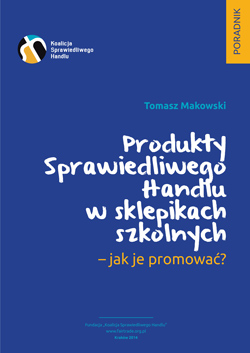 The second publication, also in A4 format, contains 28 pages of content (against 20 initially planned). We use it to show how to introduce Fair Trade products in school canteens, how to display and market them and even include Fairtrade stickers to cut out and use.
The second publication, also in A4 format, contains 28 pages of content (against 20 initially planned). We use it to show how to introduce Fair Trade products in school canteens, how to display and market them and even include Fairtrade stickers to cut out and use.
Here’s the publication’s TOC:
- Why Fair Trade
- Main Fair Trade certification systems
- Principles of using Fair Trade marks
- Setting up a Fair Trade school canteen
- What may be sold in a school canteen
- Products presentation in a school canteen – hints
- Useful links
- A school canteen checklist
- Stickers for cutting out
Both publications were done in-house (source files are in Adobe InDesign 6), printed and made available online in full color and grayscale (the latter more friendly for home printers).
Recruitment
At this stage we asked our partner NGOs to help us man the project. Then we prepared a mailing sent to around 10,000 schools in Poland. The result exceeded our expectations – over 90 schools registered for the project. We had to narrow our choice to 40 of them. During recruitment we put a special emphasis on young people at risk of marginalization, including people with disabilities, living in rural areas and small towns as we believe schools from such regions have fewer opportunities to take part in projects. We also examined their level of knowledge, existing commitment and ability to implement the project tasks.
The +40 schools which did not make it into the project were invited to be on a waiting list. The waiting list serves two purposes. First, if any of the 40 selected schools had to back away, schools on the waiting list could replace them. Secondly, the schools on the waiting list are also being informed about project’s progress but are not given the same level of support.
For the actual mailing we used phpList software which allows us to track information such as how many recipients opened the message and how many clicked the links in it.
The registration form was a Google Docs spreadsheet into which all data was collected. This or similar solution is recommended because you have all the data in one place and you are able to quickly compile a list.
Training
For training we organise both seminars and webinars. Last year in October we ran two seminars in Kraków, inviting as participants our partner NGOs and teachers interested in this subject. However, the primary purpose of the seminars was to help NGO representatives prepare for going to schools with Fair Trade lectures. Participants were also trained how to make their presence in schools interesting and interactive. Below you can find 3 presentations from the seminars (in Polish).
- A seminar: Project introduction for NGOs (file formats: PPT, 2 MB / PPS, 2 MB / PDF, 1 MB)
- A seminar: How to implement lasting changes (file formats: PPT, 1 MB / PPS, 1 MB / PDF, 1 MB)
- A seminar: Introducing Fair Trade Towns campaign (file formats: PPTX, 11 MB / PPS, 31 MB / PDF, 12 MB)
In between the seminars we also organised two webinars for the teachers. We invited teachers both from the project list as well as the ones who are on the waiting list. Each webinar was repeated three times to make it easier for the teachers to take part. The first webinar was an introduction to the project so that the teachers know what to expect, what their tasks are going to be and what support they can count on.
The second seminar was devoted to describing what Fair Trade is and how best to present Fair Trade in schools.
Since we support teachers from around 90 schools we decided that for such a big group simple communication tools such as skype are going to be inadequate and therefore we purchased a monthly access to one of the many available webinar systems – in our case it was www.clickmeeting.pl.
Campaigning in schools
For the direct project recipients it is the most intensive phase and includes activities for students in 40 schools run by teachers and representatives of Fair Trade organisations. Students are going to prepare and conduct activities related to the World Fair Trade Day (WFTDay – Saturday 2 May 2015), the Global Education Week (TEG – the third week of November 2014 and 2015) and the World Consumer Rights Day (15/03/2015 and 03/15/2016).
In order to extend the project influence to a wider groups of school employees, all active 40 schools received Fair Trade products to organise a Fair Trade Breakfast for the school personnel. At the same time our representatives (workers from our partner NGOs) were sent to these schools to run activities related to Fair Trade and global education.
Prior to each important event, such as a representative visit, Global Education Week or the World Consumer Rights Day, all project participants received relevant mailing with ideas for student engagement and simple promotional tools such as banners (see banners for Global Education Week and World Consumer Rights Day – banners for World Fair Trade Day are in the making), QR codes to be placed on any print-outs etc. The QR codes contain links to relevant web pages.
Our main campaign website which runs on one of the open-source platforms contains all the resources we prepare – mailings contain only a summary of suggested activities.
Sample ideas
- A Fair Trade Brunch
The whole class or a group prepares a Fair Trade advert (a video, an audio for a school radio station, a poster for a school canteen), a PowerPoint presentation or a radio interview about Fair Trade. It is a good idea to include in it Fair Trade principles as well as Fair Trade activities a given school has carried out so far. Students/pupils not directly involved in producing one of the above resources, prepare meals with Fair Trade ingredients and information where they are from (the country of origin). Adverts and/or presentations can be displayed during a school assembly connected with serving Fair Trade refreshments. A common meal may present an ideal venue to honestly discuss Fair Trade principles and further options for a given school to include Fair Trade in its agenda.
- A school assembly
Pupils gather in a venue such as a gym where they are shown presentations/lectures about Fair Trade. In order to make it more interesting, you can consider organising an Oxford debate and employ PechaKucha or TEDx technique. Serving refreshments, showing Fair Trade movies or inviting an engaging Fair Trade lecturer goes a long way towards making the school assembly more interesting. When inviting well-known travellers, you can ask your local authorities for mini-funds to help finance such activities.
- Serving refreshments
Some Fair Trade products may be expensive. Therefore, if you cannot afford to give away lots of Fair Trade chocolate, you can ask students/pupils to bake cookies from Fairtrade cocoa/sugar. It is worth to connect serving refreshments with other activities.
- A culinary contest
Why not organise a contest for the most interesting recipe which includes using both Fair Trade and local ingredients? You should consider grading recipes based on how attractive they appear and how healthy they are. You can also ask pupils to decide which ingredients are local and which are Fair Trade (or could potentially be Fair Trade). The final stage may include testing the recipes by doing the actual cooking/baking.
- A knowledge contest
You can organise a contest, testing students/pupils’ knowledge of Fair Trade. There are lots of ready-made quizzes you can find online.
- Foreign schools and partner towns
If you have a Fair Trade School or you live in a town/city whose partner town abroad has a Fair Trade Town status, you can organise a teleconference (even during a school assembly) and talk about possibility of doing something Fair Trade-related together. You can also ask them to show you how they go about promoting Fair Trade in their schools. If your partner town is located in the global South, you have an opportunity to learn more about lives of the local farmers.
- Visiting your local government
On 15 January 2014 a new EU directive regarding public procurements was passed. It makes it easier for public bodies to purchase ethically sourced products. You can ask your local authorities whether they plan to order Fair Trade products.
Students/pupils can also ask for permission to attend a council meeting to talk about Fair Trade in general as well as about Fair Trade Towns campaign, encouraging the authorities to take part in it.
It goes without saying that you need to prepare for each such a visit well beforehand and it is advisable to also report it in school, using the available resources (school radio station, newsletter, assembly etc.).
- Open doors
There are times when schools advertise themselves in order to draw prospective students/pupils to them. It is a great opportunity to boast about being part of the Fair Trade movement and working towards becoming a Fair Trade School. You can use your school radio station, a newsletter or refreshments to share such information.
- Fair Trade Bridge
Students/pupils visit another school (or lower grades) where they use a multimedia presentation or mini-lectures to talk about Fair Trade. Serving Fair Trade refreshments and/or offering quizzes ideally supplements such activities.
- Going to the cinema
Students/pupils from various grades (or even schools) meet in a local cinema to watch a film about Fair Trade. They have to organise the screening, they can also invite a Fair Trade lecturer and/or offer Fair Trade refreshments.
- Mapping out Fair Trade product local availability
Students work in groups consisting of 2-3 persons. Each group has a task to check the availability of Fair Trade products in a different part of their town. They have to visit shops, cafes restaurants etc. to check whether they stock any Fair Trade/Fairtrade products. When they spot some, they enter them into a form. They can also make photos to document it. When they are ready, they can use Google Map to display each and every Fair Trade place.
- Fair Trade Train
Fair Trade Train is a town game for teams consisting of two students and a teacher. They represent their schools or other types of educational institutions. Each school can submit any number of teams. It works best with students rather than pupils.
Each team has to follow a route by using a map and carry out tasks on their way. The tasks include challenges relating to responsible consumption, Fair Trade, global education, etc. You can include Fair Trade principles at each checkpoint. The winner is the team who carries out the tasks best in the shortest possible time.
Engaging and motivating
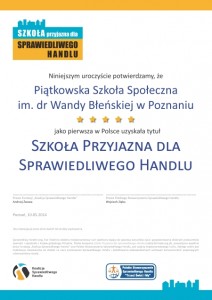 In order to increase student engagement schools are encouraged to apply for the Fair Trade School title. You can see a sample Fair Trade School certificate on the right. Another way we engage students is by organising a competition on the best presentation of the campaigns conducted by students. To make it easier for students, we prepared a simple PowerPoint template with suggested sections to complete.
In order to increase student engagement schools are encouraged to apply for the Fair Trade School title. You can see a sample Fair Trade School certificate on the right. Another way we engage students is by organising a competition on the best presentation of the campaigns conducted by students. To make it easier for students, we prepared a simple PowerPoint template with suggested sections to complete.
Evaluating and sharing results
We encourage feedback to be shared with us via the campaign website (this website). When we ask teachers to share what they are planning to do in relation to a given event (or to report what they did), we always use a webpage with a Google Docs form which teachers complete. The same is true when we organise surveys. We carried out a survey of the two above mentioned publications by using Google Docs solutions as it makes it very easy to analyse results later.
In 2016 we are planning to organise a seminar to summarize the project for all the stakeholders (teachers, partners and NGOs). The seminar will also be accompanied by a project report with a presentation of good practices (40 pp, A4 color).
During the project we are regularly verifying Fair Trade Schools criteria as well as procedures and documents related to Fair Trade Schools campaign.
Project results
Our broad goal for this pilot project is to test our Fair Trade Schools campaign to be able to fully implement it once all details will have been finalised and polished.
We want to increase student economic knowledge on unfair trade relations in the globalized supply chains so that they know why Fair Trade is needed in the first place.
We also hope that young people from 40 schools will acquire knowledge and practical citizen skills in order to use them through participation in public life and initiatives for the local community and in local governments. Students will be encouraged to volunteer for the common good through the Fair Trade Schools campaign in order to promote responsible consumption, making young people sensitive to their rights as consumers and the right of producers in the global South.
Embedding banners
Here are some banners we would like to ask you to embed on your websites to help us promote the project. Thank you very much in advance!
Banner 125 x 125 px
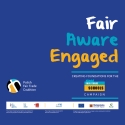
The code for copying and pasting:
Banner 160 x 500 px

The code for copying and pasting:
Banner 750 x 200 px

The code for copying and pasting:



